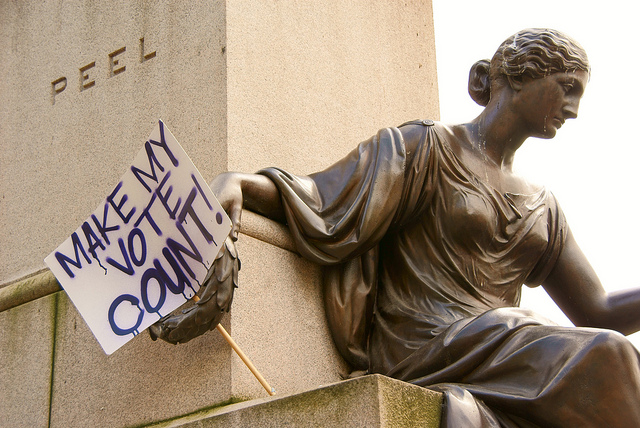Electoral reform never seems to quite fall off the agenda. The presidential debacle in the U.S. — Clinton won the popular vote but Trump will be president, just like Gore and Bush in 2000 — has rekindled the debate down there.
Since we’re supposed to already have democracy, it always comes as a surprise to realize we aren’t there yet.
You’d think we were stuck in the Britain of the mid-1800s, the heyday of Chartism. It was a mighty mass movement of working people whose lives and communities had been shattered by, among other things, free trade! Their solution wasn’t a Marxist overthrow of “the ruling class” but extending the vote to all (meaning, at the time, all men) rather than only the rich.
In other words they wanted what Bernie Sanders calls “a political revolution” in order to resolve an economic crisis of inequality and despair. In coming decades nearly all their demands were achieved, yet here they/we are again, wondering how to fix the political system so it can address widespread economic carnage. The great question about modern history may be: why didn’t giving everyone the vote lead automatically to a society far juster and fairer than this?
Last month Justin Trudeau reneged on his solemn vow to reform our foul, undemocratic, first-past-the-post system. His reason? “People” like his government so they’ll vote for him anyway even if he cans that reform thing. He walked it back a day later, probably a wise move, especially vis-a-vis millennials.
It’s interesting how willing many of them are to get involved in electoral politics. We saw them flock to Bernie when he ran against Clinton. They were primarily outraged by his loss to her, not by last week’s election. Many didn’t even vote in it because the system seemed so unresponsive to them. In other words they’ll engage electorally but they’re discriminating about when and how.
My own generation often simply dismissed elections as capitalism’s way to manipulate the masses. We preferred being overthrowers. Millennials are less ideological. They’ve largely traded our enchantment with ideology for a fascination with technology, with how to make things work. They’re tinkerers. Random example: a millennial I know says shootout rules in the NHL should allow the defending team to send a player in pursuit of the shooter several seconds after he crosses centre ice, thus eliminating those sadistically slow T.J. Oshi-type skate-ins. I doubt anyone over 30 could have come up with that.
They were big Trudeau fans last election and they won’t be impressed if he drops a principled promise because voters are momentarily besotted with him. Especially if the NDP unexpectedly acquires a decent, attractive leader.
What reform should the Liberals go for? IMHO, the ranked ballot would be the easiest sell. It’s simplest: you rank candidates in your riding in order of preference. If none has a majority, the lowest drops off and those votes are redistributed among the remainers. And so on till somebody has 50 per cent.
It’s not perfect but it avoids the most undemocratic (but common) result: someone comes up the middle because the other candidates divide a majority of votes, even though, given a choice, most of those voters would’ve preferred anyone else. The winners are usually, though not always, Tories. The other reform option, proportional representation, has mind-numbing variations, almost all of which are hell to explain. People grow faint trying to figure them out.
Trudeau would be wise to get the NDP and Greens onside. (The Tories will say no for obvious reasons.) He could tempt them by restoring public funding for parties based on percentage of votes received. If they refuse, he could blame them for the failure, or go it alone with his (phoney) majority because the principle is so deeply democratic, plus he promised and his word is golden, etc.
In high school we were taught that the difference between a politician and a statesman is the former thinks only about now; the latter, about the future. So there’s that for Trudeau to ponder.
But there’s also, always, your gut. Can you stomach the inevitability of future governments without a majority of votes — in fact, with the majority often loathing them — winning anyway and governing as if they’d been overwhelmingly elected, then going on to shred lives and institutions in the future, as they did so recently in the past?
This column was first published in the Toronto Star.
Photo: Sony200boy/flickr




